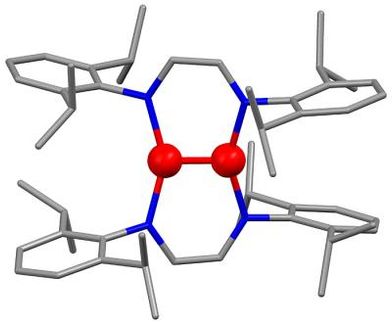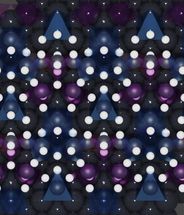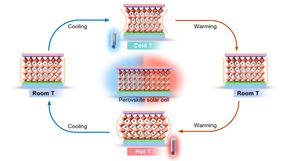Electron switch between molecules points way to new high-powered organic batteries
The development of new organic batteries—lightweight energy storage devices that work without the need for toxic heavy metals—has a brighter future now that chemists have discovered a new way to pass electrons back and forth between two molecules.
The research is also a necessary step toward creating artificial photosynthesis, where fuel could be generated directly from the sun, much as plants do.
University of Texas at Austin chemists Christopher Bielawski and Jonathan Sessler led the research, which was published in Science.
When molecules meet, they often form new compounds by exchanging electrons. In some cases, the electron transfer process creates one molecule with a positive charge and one molecule with a negative charge. Molecules with opposite charges are attracted to each other and can combine to form something new.
In their research, the chemists created two molecules that could meet and exchange electrons but not unite to form a new compound.
"These molecules were effectively spring-loaded to push apart after interacting with each other," says Bielawski, professor of chemistry. "After electron transfer occurs, two positively charged molecules are formed which are repelled by each other, much like magnets held in a certain way will repel each other. We also installed a chemical switch that allowed the electron transfer process to proceed in the opposite direction."
Sessler adds, "This is the first time that the forward and backward switching of electron flow has been accomplished via a switching process at the molecular scale." Sessler is the Roland K. Pettit Centennial Chair in Chemistry at The University of Texas at Austin and a visiting professor at Yonsei University.
Bielawski says this system gives important clues for making an efficient organic battery. He says understanding the electron transfer processes in these molecules provides a way to design organic materials for storing electrical energy that could then be retrieved for later use.
"I would love it if my iPhone was thinner and lighter, and the battery lasted a month or even a week instead of a day," says Bielawski. "With an organic battery, it may be possible. We are now starting to get a handle on the fundamental chemistry needed to make this dream a commercial reality."
The next step, he says, is to demonstrate these processes can occur in a condensed phase, like in a film, rather than in solution.
Organic batteries are made of organic materials instead of heavy metals. They could be lightweight, could be molded into any shape, have the potential to store more energy than conventional batteries and could be safer and cheaper to produce.
The molecular switch could also be a step toward developing a technology that mimics plants' ability to harvest light and convert it to energy. With such a technology, fuel could be produced directly from the sun, rather than through a plant mediator, such as corn.
"I am excited about the prospect of coupling this kind of electron transfer 'molecular switch' with light harvesting to go after what might be an improved artificial photosynthetic device," says Sessler. "Realizing this dream would represent a big step forward for science."
Most read news
Other news from the department science

Get the chemical industry in your inbox
By submitting this form you agree that LUMITOS AG will send you the newsletter(s) selected above by email. Your data will not be passed on to third parties. Your data will be stored and processed in accordance with our data protection regulations. LUMITOS may contact you by email for the purpose of advertising or market and opinion surveys. You can revoke your consent at any time without giving reasons to LUMITOS AG, Ernst-Augustin-Str. 2, 12489 Berlin, Germany or by e-mail at revoke@lumitos.com with effect for the future. In addition, each email contains a link to unsubscribe from the corresponding newsletter.
Most read news
More news from our other portals
See the theme worlds for related content
Topic World Battery Technology
The topic world Battery Technology combines relevant knowledge in a unique way. Here you will find everything about suppliers and their products, webinars, white papers, catalogs and brochures.

Topic World Battery Technology
The topic world Battery Technology combines relevant knowledge in a unique way. Here you will find everything about suppliers and their products, webinars, white papers, catalogs and brochures.
Topic world Synthesis
Chemical synthesis is at the heart of modern chemistry and enables the targeted production of molecules with specific properties. By combining starting materials in defined reaction conditions, chemists can create a wide range of compounds, from simple molecules to complex active ingredients.

Topic world Synthesis
Chemical synthesis is at the heart of modern chemistry and enables the targeted production of molecules with specific properties. By combining starting materials in defined reaction conditions, chemists can create a wide range of compounds, from simple molecules to complex active ingredients.





















































